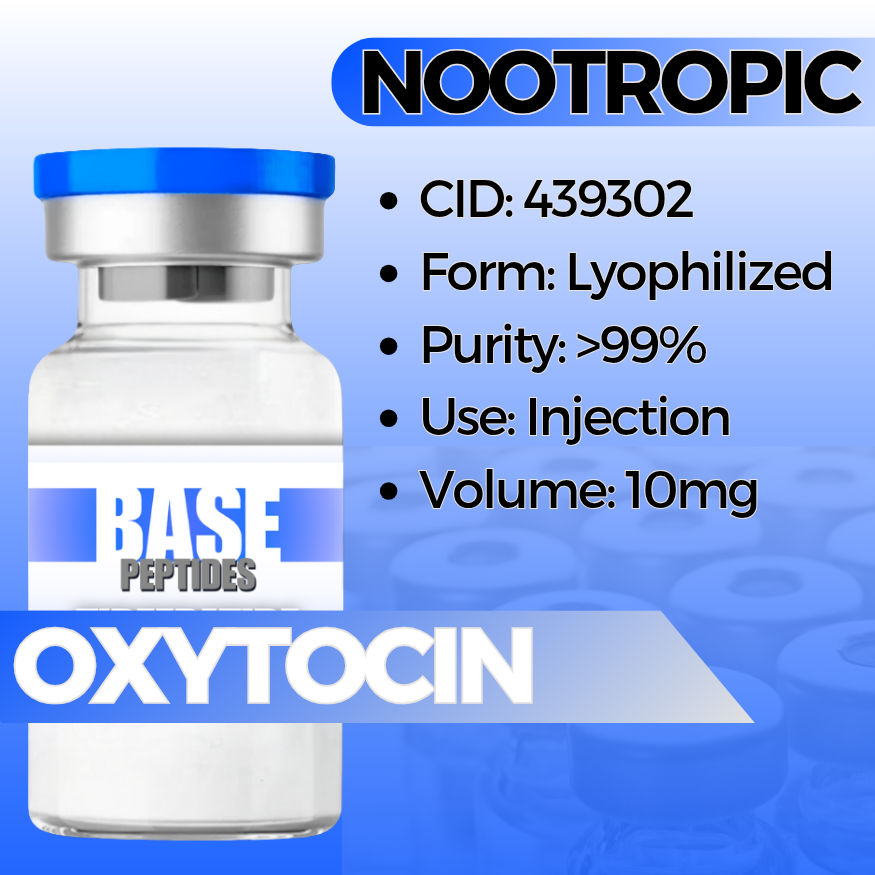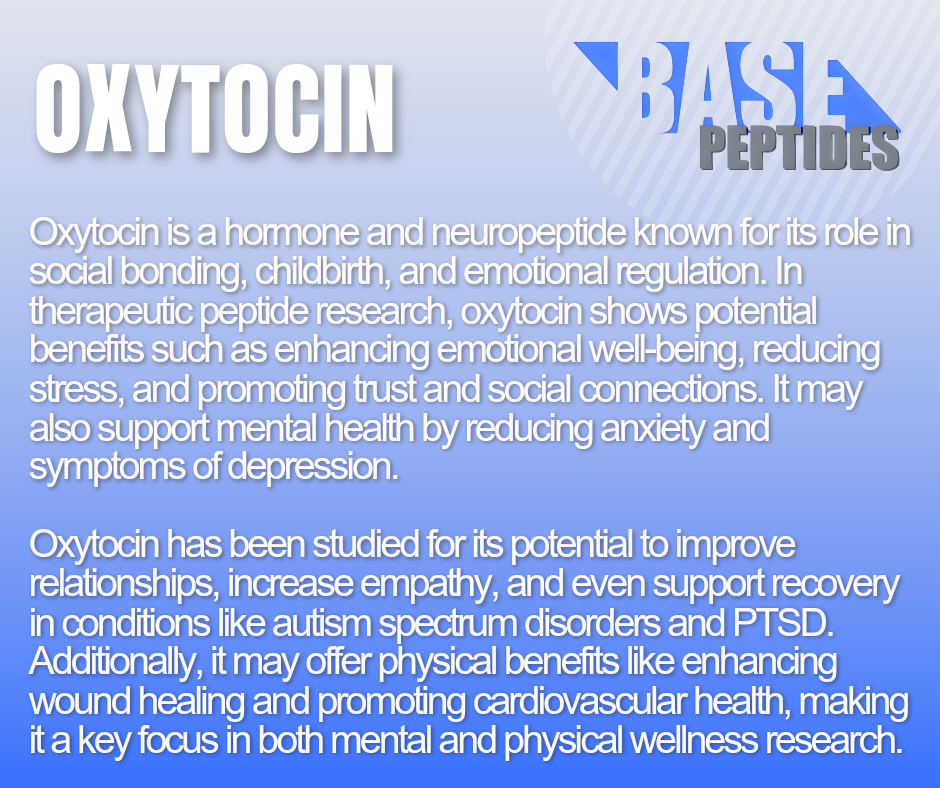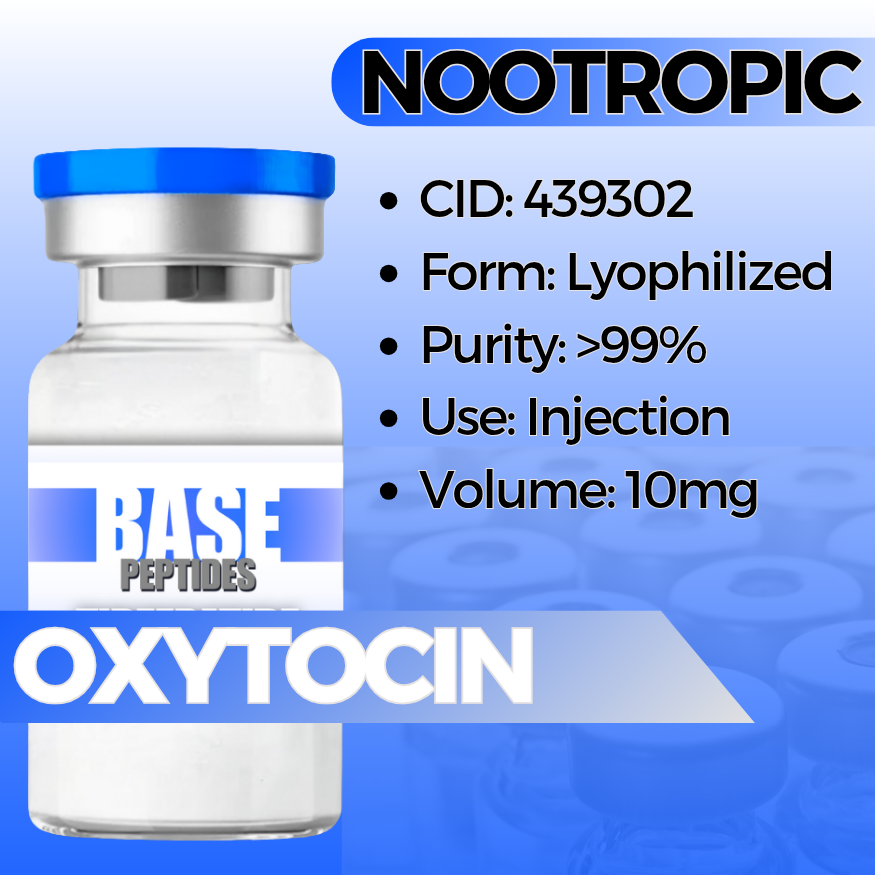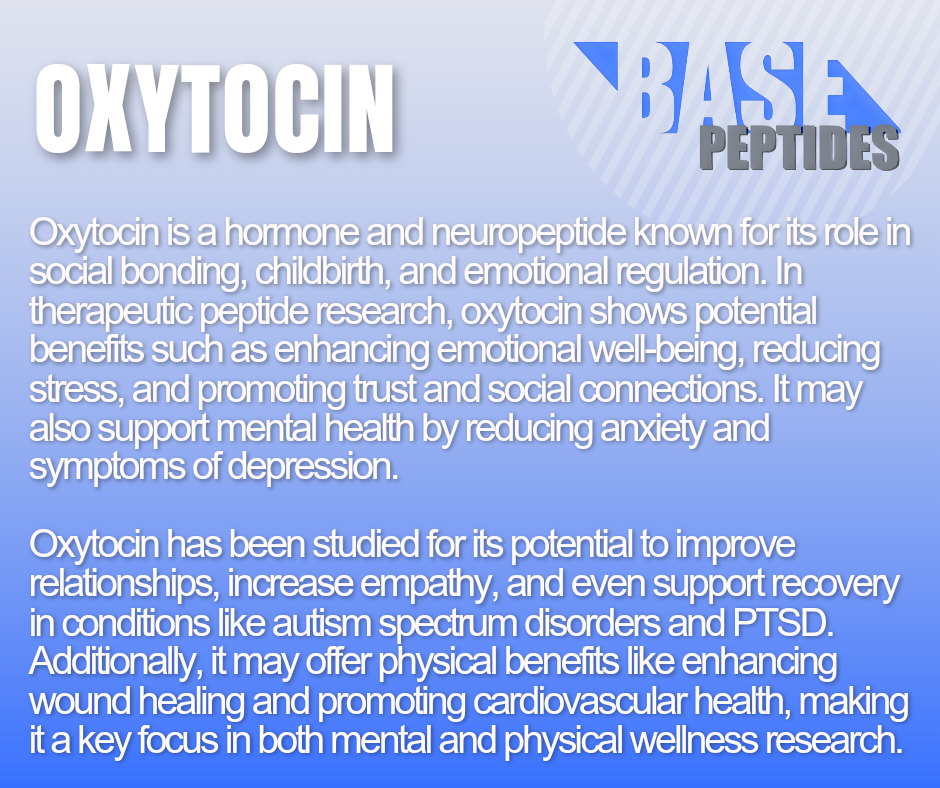Oxytocin
Oxytocin
Base Peptides are intended for licensed medical professionals and experienced researchers. Reconstitution required. Dosing and use instructions are not provided.
Couldn't load pickup availability
Oxytocin — Endogenous Nonapeptide (Neuroendocrine Research)
Oxytocin is a naturally occurring nonapeptide produced in the hypothalamus and released from the posterior pituitary. It’s widely used in research to study social behavior and stress responses, as well as uterine smooth-muscle contraction and lactation physiology.
- CAS: 50-56-6
- PubChem CID: 439302
- Molecular formula / MW: C43H66N12O12S2 · ~1007.19 g·mol⁻¹ (free peptide)
- Sequence (human): Cys–Tyr–Ile–Gln–Asn–Cys–Pro–Leu–Gly–NH2
- Structure note: Intramolecular disulfide bond between Cys1–Cys6; amidated C-terminus.
- Binds the Oxytocin Receptor (OXTR), a G-protein–coupled receptor typically signaling through Gq/11 → phospholipase C → intracellular Ca2+.
- Peripherally, it’s a classic model for uterotonic activity and milk let-down in lactation studies.
- Centrally, it’s used to explore social bonding, trust, anxiety, and HPA-axis modulation (stress physiology).
- To map OXTR signaling (Ca2+ dynamics, IP3, ERK) and receptor pharmacology.
- To study social behavior and affiliative cues in animal and human lab paradigms.
- To probe uterine contractility, myoepithelial responses, and smooth-muscle mechanics.
Key Studies — What Was Tested, What Changed, Why It Matters
Uterine & lactation mechanics (classic physiology)
- What was tested: OXTR activation in uterine and mammary tissues; Ca2+-dependent contraction and myoepithelial responses.
- What changed: Robust, dose-dependent contractions and milk ejection in ex vivo and in vivo models.
- Why it matters: Provides a reproducible benchmark for smooth-muscle pharmacology and receptor-signal coupling.
Social behavior & stress modulation (CNS)
- What was tested: Controlled exposure (often intranasal in human lab work; central/peripheral in animals) with behavioral and endocrine endpoints.
- What changed: Context-dependent effects on social salience, prosocial behavior, and HPA-axis readouts (e.g., cortisol).
- Why it matters: Supports oxytocin as a tool for dissecting neuroendocrine–behavior links.
Receptor selectivity & cross-talk
- What was tested: Binding and functional assays vs. vasopressin receptors (V1a/V1b/V2).
- What changed: At higher concentrations, oxytocin can show cross-reactivity with vasopressin receptors in some systems.
- Why it matters: Design experiments to separate OXTR-specific effects from AVP-receptor activity.
Potential Research Applications
Neuroendocrine & Behavior
- Social-interaction tasks; stress-challenge/HPA-axis assays
- fMRI/EEG with pharmacologic OXTR probing
Reproductive Biology
- Uterine contractility / myometrium signaling
- Mammary myoepithelial dynamics (let-down models)
Receptor Pharmacology
- OXTR vs AVP receptor selectivity
- Biased signaling, desensitization, and internalization
Synergistic Peptides (for Study Design)
Vasopressin (Arg8-Vasopressin)
- Why pair: Closely related nonapeptide; helps parse OXTR vs AVP receptor effects and social-stress interactions.
- Angle: Cross-over designs with receptor antagonists (e.g., V1a blockers) to isolate pathways.
Carbetocin (Oxytocin analogue)
- Why pair: Longer-acting analogue for stability/PK comparisons.
- Angle: Contrast onset/offset, receptor desensitization, and tissue selectivity.
Atosiban (OXTR/AVP antagonist)
- Why pair: Useful antagonist control to confirm OXTR-mediated effects.
- Angle: Include antagonist arm to verify specificity in uterine and CNS assays.
Design Notes
- Clearly define route (peripheral vs central/intranasal in lab settings), timing, and endpoints.
- Account for short half-life (minutes in plasma); consider repeated or controlled delivery for time-course work.
- Report salt/form (e.g., acetate) and vehicle; peptide stability and adsorption can affect results.
Known Concerns (Context)
- Peripheral vs central effects: Limited CNS penetration peripherally—designs should match the question (behavior vs peripheral physiology).
- Cross-reactivity: Possible AVP receptor activity at high concentrations; include selectivity controls.
- General: Research use only; not for human consumption or therapeutic use.
Follow institutional SOPs for peptide handling; pre-register endpoints where applicable.
Specifications & Handling
- Form: Lyophilized powder (lot-coded)
- Purity: ≥ 99% (HPLC/MS verified)
- Storage: ≤ −20 °C; protect from light/moisture
- In solution: Prepare fresh aliquots; avoid repeat freeze–thaw; use low-bind plastics/glass to reduce adsorption
- Additives: None unless specified per lot
- Packaging: Tamper-evident; research-only labeling
Regulatory & Use Notice
Sold for laboratory research use only. Not for human consumption, medical, or veterinary use. No human-use instructions are provided. Buyer is responsible for safe handling and regulatory compliance.
Oxytocin Peptide Research | Nonapeptide | OXTR Signaling, Social Behavior, Uterine Contractility & Lactation Studies






